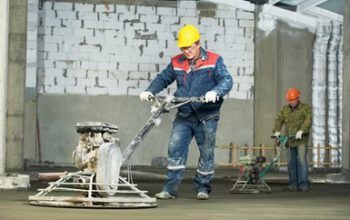A concrete contractor is a professional who makes and installs new and repaired concrete. They also make sure that the project follows local laws and regulations. They are also openly communicative about the timeline and overall costs of the project.

It is important for contractors to know their target market. They may prefer to do residential work, such as pouring walkways and patios, or they may like to focus on commercial projects like public works and schools. Visit https://concretecontractorcoloradosprings.com/ for more information.
A concrete contractor can have a career that is rewarding and lucrative. They must have the ability to work under pressure, and they should be able to provide quality service that is timely and within budget. They also must have the right equipment to complete the job. They may need to be a member of a trade association to stay current with industry news and trends. This is especially important if they are working in the commercial construction sector.
The first step in becoming a concrete contractor is to decide which area of the field you want to specialize in. Some contractors focus on residential construction, while others are more interested in commercial construction projects like schools and offices. Some contractors even have a specialty such as decorative or polished concrete. The second step is to make sure that you have the right business plan and financial backing to get started in this line of work.
Some states have requirements for concrete contractors that must be met before they can engage in any concrete work. This includes licensing and worker’s compensation insurance. In addition, some states require a bond to be posted before the contractor can start any work. The best way to find out the specific requirements for your state is to speak with a lawyer or contact a local chapter of the American Society of Concrete Contractors.
It is important that a concrete contractor has the proper equipment for the job. They must be able to prepare the site before pouring concrete, which involves backfilling and excavating the ground. Then, they must ensure that the concrete is placed on a proper foundation to prevent structural problems.
Concrete contractors also have to be able to communicate with their clients and supervisors effectively. They must keep everyone updated on the progress of their work, which is essential for the success of any construction project. Some contractors use project management software to ensure that updates are sent quickly.
In addition to these skills, a concrete contractor should have good relations with suppliers who can deliver the necessary materials on time. Many concrete contractors create agreements with their supplier to guarantee that they will receive the proper amount of concrete for each job. Having reliable suppliers can save you a lot of time, money, and headaches.
Job duties
Concrete contractors have a very interesting and rewarding job. They work with one of the most versatile construction materials out there, concrete, and they get to help build something that will last a long time. The job is very active and exciting, and they also get to travel a lot for work.
A professional concrete contractor has the experience and expertise to ensure that your project is completed on time and in a high quality. They know how to mix and pour the concrete properly, and they can also add decorative touches to the finished product. They can even help you save money on material costs by purchasing concrete at a discounted rate.
One of the most important duties for a concrete contractor is to analyze the scope of the work that needs to be done. This includes determining the size and shape of the structure, as well as ensuring that it meets local building codes. The contractor must also determine how much concrete is needed. This is a critical step, since the wrong amount of concrete can lead to problems with the finish and durability of the structure.
Another key job duty of a concrete contractor is to prepare the site before the concrete is poured. This includes removing any debris or dirt that could interfere with the concrete, and ensuring that the area is clear of obstructions. The contractor must also make sure that the area is level and smooth, and he or she may use tools to do this.
The concrete contractor must also set forms designed to hold the concrete and ensure that they are properly aligned. He or she must also install expansion joints and rebar, as called for in the job specifications. The contractor must also keep the supervisor and other contractors updated about the progress of the concrete work. This can be done by text, email, or a project management software.
A good concrete contractor will also be licensed and insured. This will ensure that they are able to work safely on the jobsite and will be able to handle any potential problems that might arise during the construction process.
Work environment
Concrete Contractors work in the construction industry and must be able to read blueprints, and follow both written and oral instructions. They also work with pump, conveyor and ready-mix truck operators and must be able to communicate with them via signals. Other job duties include mixing the concrete and transporting it to the jobsite, removing unneeded materials from the working area, and ensuring that the job site is clean and safe for all workers.
A good concrete contractor will be open about the timeline and cost of a project, and they will take measurements to make sure that the concrete surfaces are level and even. They also may use a number of tools and techniques to create the forms in which the concrete is placed. These forms can be made of wood or metal, and they are used to hold the concrete while it sets.
Many contractors also provide design and planning services to customers. This includes reviewing blueprints and plans, selecting building materials, estimating costs, identifying potential problems and identifying solutions. They may also create drawings or models that show project details, oversee 3rd party inspections, manage subcontractors and equipment vendors, and develop safety protocols.
Because of the demands of this job, it’s important for concrete contractors to be able to work under pressure and meet deadlines. They must be able to take directions from the jobsite’s foreman and must be able to work quickly in a fast-paced environment.
Despite the high demand for concrete construction, there are still challenges to the career path. For example, the weather can have a big impact on the progress of a project, as concrete needs to be poured in a certain temperature range to set correctly. If the weather isn’t right, it can delay the entire project while workers wait for a better day to work.
For this reason, concrete contractors must be able to adapt to changing weather conditions and be flexible with their schedules. It’s also important that they maintain excellent communication with clients throughout the project, as this can help reduce confusion and errors. Additionally, they should keep other construction workers and supervisors updated on their progress, so they can plan accordingly.
Requirements
Concrete is an essential component of many commercial, industrial, and residential projects. It is a versatile material that can be used for floors, walls, driveways, and more. If you’re interested in becoming a concrete contractor, there are some requirements that you must meet. In addition to having the right training, you must also have a strong business plan and adequate funding. You’ll need to decide whether you want to work on commercial or residential projects, and you should have a clear idea of your target market. It’s also important to understand your state’s licensing requirements. While this varies by state, most concrete contractors need to have a general contractor license and must carry workers’ compensation insurance and a bond.
Another requirement for concrete contractors is a truck or other vehicle to transport materials and equipment. You’ll also need to arrange for a reliable supply of concrete, which is usually pre-mixed. It’s best to find a supplier that offers delivery services, as this will save you time and effort. You’ll also need to have a good working relationship with your suppliers, as you will be relying on them for your supplies.
A concrete contractor needs to have a wide range of tools to complete their job. In addition, he or she must have the appropriate safety gear to protect themselves from potential accidents. A concrete contractor must also understand the different types of concrete and their applications. A good concrete contractor will be able to use his or her knowledge of engineering and design to create a concrete structure that meets the client’s specifications.
Becoming a concrete contractor is a challenging and rewarding career. It requires extensive education, hands-on experience, and a solid business plan. The best way to get started is by taking an associate or bachelor’s degree in civil engineering. In addition, you should seek out firsthand industry experience to gain a deeper understanding of the trade. You should also consider joining a general contracting firm to learn the skills of the industry and make valuable connections. Then, you’ll be prepared to begin your career in concrete construction.

